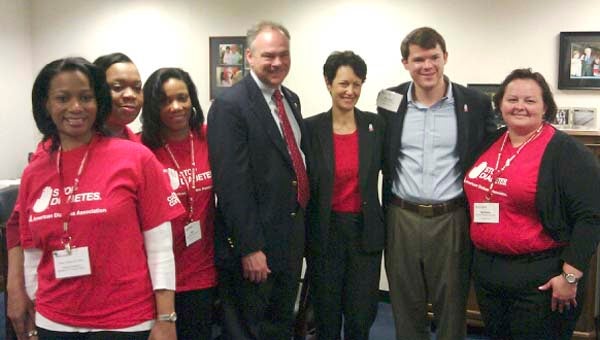Capron woman brings diabetes awareness to D.C.
Published 10:54 am Wednesday, March 13, 2013

From left are Shaun Rivers, an RN from Richmond, Michelle Foster, Kim Ketter, also an RN from Richmond and twin to Rivers, Sen. Tim Kaine, Shereen Arant, executive vice president for government affairs and advocacy with the American Diabetes Association, Rhodes Ritenour, president of the Richmond ADA board, and Michelle Harmon, corporate chair for the Community Leader Board for ADA. This past week they were in Washington, D.C. to educate legislators about diabetes and seek financial support for research. — SUBMITTED
CAPRON—A Capron woman returned Thursday from a visit to Washington, D.C., to enlighten legislators about diabetes.
Though she does not have the disease, Michelle Harmon, 38, has been made more aware of it because her grandmother and stepfather are affected. For the past couple of years, she’s also familiar with the malady through her work as a pharmacy district manager for Farm Fresh.
“About 1-1/2 years ago I was asked by Hampton Roads Chapter of the American Diabetes Foundation to participate,” said Harmon. “I’ve been the corporate chair for the past year for Hampton Roads.”
She said her research through the American Diabetes Association has shown that Franklin has the highest discharge rate for diabetes-related complications in Virginia. Suffolk is in second place, added Harmon. She was citing a 2011 story from The Virginian-Pilot that the Commonwealth is considered by some to be part of the Diabetes Belt, which is a string of states where diabetes is a common problem, including Kentucky, Georgia and West Virginia.
While in Washington, Harmon and company talked to Sen. Tim Kaine, D-Va., staffers for Congressman Randy Forbes, R-Chesapeake, Sen. Mark Warner, D-Va., and legislative aides for Eric Cantor, R-Richmond.
“We asked for more funding for the National Institutes of Health, the Centers for Disease Control and also for them to co-sponsor the Medicare Diabetes Prevention Act,” said Harmon.
On behalf of the 26 million Americans with diabetes and the 79 million with pre-diabetes, the ADA specifically seeks $2.2 billion for the NIH’s branch that deals specifically with diabetes, digestive and kidney diseases. That group researches for a cure and advance treatments for diabetes.
The ADA wants to get $86.3 million for the CDC’s Division of Diabetes Translation, which is also doing research. Another $20 million for fiscal year 2013-14 is sought for the National Diabetes Prevention Program.
That desired legislation would offer coverage of the National Diabetes Prevention Program through Medicare. It would go to individuals who are “at high risk of developing type 2 diabetes in order to reduce the number of Medicare beneficiaries who develop the disease and rein in health care spending.”
“I feel like we are spreading the awareness of diabetes education and prevention,” said Harmon.




